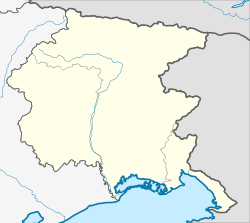| Gonars Gonârs (Friulian) | |
|---|---|
| Comune | |
| Comune di Gonars | |
| Location of Gonars | |
  | |
| Coordinates: 45°54′N 13°14′E / 45.900°N 13.233°E / 45.900; 13.233 | |
| Country | Italy |
| Region | Friuli-Venezia Giulia |
| Province | Udine (UD) |
| Frazioni | Ontagnano, Fauglis, Bordiga, Mulini |
| Government | |
| • Mayor | Ivan Diego Boemo |
| Area | |
| • Total | 19.9 km (7.7 sq mi) |
| Elevation | 21 m (69 ft) |
| Population | |
| • Total | 4,729 |
| • Density | 240/km (620/sq mi) |
| Demonym | Gonaresi |
| Time zone | UTC+1 (CET) |
| • Summer (DST) | UTC+2 (CEST) |
| Postal code | 33050 |
| Dialing code | 0432 |
| Patron saint | Saint Canziano |
| Saint day | May 30 |
| Website | Official website |
Gonars (Friulian: Gonârs) is a town and comune (municipality) in the Regional decentralization entity of Udine in Friuli, Friuli-Venezia Giulia, northeastern Italy. It is located near Palmanova.
History
| This section needs expansion. You can help by adding to it. (June 2008) |
World War II
See also: Gonars concentration campOn 23 February 1942, the Fascist regime established a concentration camp in the town, mostly for prisoners from what is now Slovenia and Croatia. The first transport of 5,343 internees (1,643 of whom were children) arrived two days later from the Province of Ljubljana and from the Rab camp and the camp at Monigo near Treviso.
The camp was disbanded on 8 September 1943, immediately after the Italian capitulation. Every effort was made to erase any evidence of it. The camp's buildings were destroyed, the materials were used to build a nearby preschool, and the site was turned into a meadow. Only in 1973 was a memorial created by the sculptor Miodrag Živković at the town's cemetery. The remains of 453 Slovenian and Croatian victims were transferred into its two underground crypts. It is believed that at least 50 additional persons died in the camp due to starvation and torture. Apart from the memorial, no other evidence of the camp remains and even many locals are unaware of it.
Among the people interned in the camp were the engineer Aleš Strojnik, writer Vitomil Zupan, poets Alojz Gradnik and France Balantič, historians Bogo Grafenauer and Vasilij Melik, sculptor Jakob Savinšek, playwright and essayist Bojan Štih, journalist Ernest Petrin, and politicians Anton Vratuša, Boris Kraigher, and France Bučar.
Twin cities
Further reading
- Alessandra Kersevan, Un campo di concentramento fascista. Gonars 1942-1943., Kappa Vu Edizioni, Udine, 2003
References
- "Superficie di Comuni Province e Regioni italiane al 9 ottobre 2011". Italian National Institute of Statistics. Retrieved 16 March 2019.
- "Popolazione Residente al 1° Gennaio 2018". Italian National Institute of Statistics. Retrieved 16 March 2019.
External links
This article on a location in Friuli-Venezia Giulia is a stub. You can help Misplaced Pages by expanding it. |
